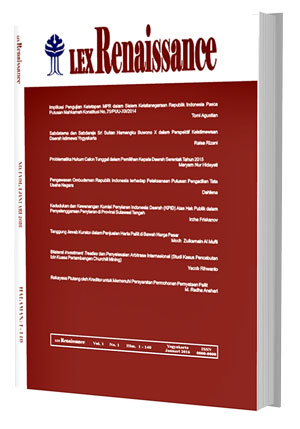Main Article Content
Abstract
Keywords
Article Details
Authors who publish with this journal agree to the following terms:
a. Authors retain copyright and grant the journal right of first publication with the work simultaneously licensed under a Creative Commons Attribution License that allows others to share the work with an acknowledgement of the work's authorship and initial publication in this journal.
b. Authors are able to enter into separate, additional contractual arrangements for the non-exclusive distribution of the journal's published version of the work (e.g., post it to an institutional repository or publish it in a book), with an acknowledgement of its initial publication in this journal.
c. Authors are permitted and encouraged to post their work online (e.g., in institutional repositories or on their website) prior to and during the submission process, as it can lead to productive exchanges, as well as earlier and greater citation of published work (See The Effect of Open Access).References
- Buku
- Adjie, Habib, Hukum Notaris Indonesia Tafsir Tematik Terhadap UU No. 30 Tahun 2004 Tentang Jabatan Notaris, Cetakan Pertama, PT Rafika Aditama, Bandung, 2008.
- Adjie, Habib, Sanksi Perdata dan Administratif Terhadap Notaris Sebagai Pejabat Publik, Refika Aditama, Bandung, 2009.
- Anand, Ghansham, Karakteristik Jabatan Notaris Di Indonesia, Prenadamedia Group, Jakarta, 2018.
- Daurus, M. Luthfan Hadi, Hukum Notariat Dan Tanggungjawab Jabatan Notaris, Cetakan Pertama, UII Press Yogyakarta, Yogyakarta, 2017.
- Irman, Tubagus, Money Laundering Hukum Pembuktian Tindak Pidana Pencucian Uang dalam Penetapan Tersangka, Jakarta: PT. Gramedia Pustaka Utama, 2017.
- McDonell, Rick, “Money Laundering Methodologies and International and Regional Countermeasures”, dikutip dari Hanafi Amrani, Hukum Pidana Pencucian Uang, UII Press, Yogyakarta, 2015.
- Poerwadarminta, W. J. S, Kamus Bahasa Indonesia, Balai Pustaka, Jakarta, 1982.
- Rifani, Nisya dan Sulihandari Hartanti, Prinsip-Prinsip Dasar Profesi Notaris Berdasarkan Peraturan Perundang-Undangan Terbaru, Cetakan Pertama, Dunia Cerdas, Jakarta 2013.
- Sekarini, Febby, Sistem Pembuktian Dalam Perkara Gratifikasi Dan Pencucian Uang, Skripsi, Fakultas Hukum Universitas Islam Indonesia, Yogyakarta, 2018.
- Setiawan, Wawan, Kedudukan Dan Keberadaan Pejabat Umum serta PPAT dibandingkan dengan Kedudukan Pejabat Tata Usaha Negara Menurut Sistem Hukum Nasional, Jakarta, 2001.
- Yustiavandana, Ivan, Arman Nefi dan Adiwarman, Tindak Pidana Pencucian Uang di Pasar Modal, Ghalia Indonesia, Bogor, 2010.
- Hasil Penelitian
- Utami, Fitrizki, “Penegakan Hukum Terhadap Tanggung Jawab Notaris Atas Pelaksanaan Tugas Pelayanan Publik (Law Enforcement On Notary’s Responsibility In Providing Public Service), Disertasi, Pascasarjana Fakultas Hukum Universitas Hasanudin, Makasar.
- Internet
- Didik Farhan, “Mungkinkah Notaris Korupsi?” http://didikfarkhan.com/index.php/catat/116-mungkinkah-notaris-korupsi, iakses pada tanggal 2 Februari 2019
- Peraturan Perundang-Undangan
- Undang-Undang Nomor 2 Tahun 2014 Tentang Perubahan Atas Undang-Undang Nomor 30 Tahun 2004 Tentang Jabatan Notaris.
- Undang-Undang Nomor 8 Tahun 2010 Tentang Pencegahan Dan Pemberantasan Tindak Pidana Pencucian Uang.
- Peraturan Pemerintah Nomor 43 Tahun 2015 Tentang Pihak Pelapor Pemberantasan dan Pencegahan Tindak Pidana Pencucian Uang.
References
Buku
Adjie, Habib, Hukum Notaris Indonesia Tafsir Tematik Terhadap UU No. 30 Tahun 2004 Tentang Jabatan Notaris, Cetakan Pertama, PT Rafika Aditama, Bandung, 2008.
Adjie, Habib, Sanksi Perdata dan Administratif Terhadap Notaris Sebagai Pejabat Publik, Refika Aditama, Bandung, 2009.
Anand, Ghansham, Karakteristik Jabatan Notaris Di Indonesia, Prenadamedia Group, Jakarta, 2018.
Daurus, M. Luthfan Hadi, Hukum Notariat Dan Tanggungjawab Jabatan Notaris, Cetakan Pertama, UII Press Yogyakarta, Yogyakarta, 2017.
Irman, Tubagus, Money Laundering Hukum Pembuktian Tindak Pidana Pencucian Uang dalam Penetapan Tersangka, Jakarta: PT. Gramedia Pustaka Utama, 2017.
McDonell, Rick, “Money Laundering Methodologies and International and Regional Countermeasures”, dikutip dari Hanafi Amrani, Hukum Pidana Pencucian Uang, UII Press, Yogyakarta, 2015.
Poerwadarminta, W. J. S, Kamus Bahasa Indonesia, Balai Pustaka, Jakarta, 1982.
Rifani, Nisya dan Sulihandari Hartanti, Prinsip-Prinsip Dasar Profesi Notaris Berdasarkan Peraturan Perundang-Undangan Terbaru, Cetakan Pertama, Dunia Cerdas, Jakarta 2013.
Sekarini, Febby, Sistem Pembuktian Dalam Perkara Gratifikasi Dan Pencucian Uang, Skripsi, Fakultas Hukum Universitas Islam Indonesia, Yogyakarta, 2018.
Setiawan, Wawan, Kedudukan Dan Keberadaan Pejabat Umum serta PPAT dibandingkan dengan Kedudukan Pejabat Tata Usaha Negara Menurut Sistem Hukum Nasional, Jakarta, 2001.
Yustiavandana, Ivan, Arman Nefi dan Adiwarman, Tindak Pidana Pencucian Uang di Pasar Modal, Ghalia Indonesia, Bogor, 2010.
Hasil Penelitian
Utami, Fitrizki, “Penegakan Hukum Terhadap Tanggung Jawab Notaris Atas Pelaksanaan Tugas Pelayanan Publik (Law Enforcement On Notary’s Responsibility In Providing Public Service), Disertasi, Pascasarjana Fakultas Hukum Universitas Hasanudin, Makasar.
Internet
Didik Farhan, “Mungkinkah Notaris Korupsi?” http://didikfarkhan.com/index.php/catat/116-mungkinkah-notaris-korupsi, iakses pada tanggal 2 Februari 2019
Peraturan Perundang-Undangan
Undang-Undang Nomor 2 Tahun 2014 Tentang Perubahan Atas Undang-Undang Nomor 30 Tahun 2004 Tentang Jabatan Notaris.
Undang-Undang Nomor 8 Tahun 2010 Tentang Pencegahan Dan Pemberantasan Tindak Pidana Pencucian Uang.
Peraturan Pemerintah Nomor 43 Tahun 2015 Tentang Pihak Pelapor Pemberantasan dan Pencegahan Tindak Pidana Pencucian Uang.




